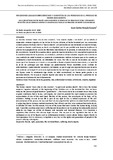Reflexiones legales sobre derechos y garantías de las personas en el proceso de morir dignamente
Fecha
2020-08-03Palabras Clave
Personas, derecho, garantía, vida, enfermedad terminal, sufrimiento, muerte, dignidadPeople, right, guarantee, life, terminal illness, suffering, death, dignity
Metadatos
Mostrar el registro completo del ítemResumen
La máxima romana “mors cita et sine cruciatu”, “una muerte rápida y sin dolor”, así se refería el emperador romano Augusto, en los inicios de la era cristiana, al hecho terminal que hoy conocemos como el proceso del buen morir o “buena muerte”, el cual resulta ser una demanda en nuestro tiempo, el morir en buenas condiciones; es decir, con dignidad, por lo que prohibir este derecho implica en la práctica la expropiación de una de las libertades más básicas de la persona, la soberanía de su cuerpo, de su existencia. Ponerle fin a nuestra vida es parte de nuestro derecho a vivir, una radical expresión de la autodeterminación de la persona, su verdadera y definitiva última voluntad, negarle este derecho en una condición de salud terminal, es someterlo a tratamientos médicos tortuosos que no lo curarán, es condenarlo a morir lentamente, en infinidades de veces. Por ello es uno de los asuntos que más le preocupa al ser humano, es el morir y a ser posible evitando el padecimiento innecesario y su posición es la de no prolongar por más tiempo sus padecimientos físicos insufribles como víctimas de enfermedades y padecimientos incurables y terminales, es por lo urge una reglamentación que resuelva este evidente vacío legal. El vacío en la reglamentación ha dado lugar a que la eutanasia o cualquiera de sus figuras como la ortotanasia siga siendo un tabú sociocultural, en buena parte gracias a su desconocimiento. Por lo que se impone legislar una nueva ley sobre los derechos y garantías de las personas en el proceso de morir dignamente
Información Adicional
| Otros Títulos | Legal reflections on the rights and guarantees of people in the process of dying with dignity |
| Correo Electrónico | jcaraujoc_65@hotmail.com; j.araujo@sed.luz.edu.ve |
| ISSN | 2244-7482 |
| Resumen en otro Idioma | The Roman maxim "mors cites et sine cruciatu", "a quick and painless death", this is how the Roman emperor Augustus referred, at the beginning of the Christian era, to the terminal fact that we know today as the process of good death or " good death ", which turns out to be a demand in our time, dying in good conditions; that is to say, with dignity, for which to prohibit this right implies in practice the expropriation of one of the most basic liberties of the person, the sovereignty of his body, of his existence. Putting an end to our life is part of our right to live, a radical expression of the self-determination of the person, his true and final will, denying him this right in a terminal health condition, is subjecting him to tortuous medical treatments that will not cure him, is to condemn him to die slowly, in infinities of times. For this reason, it is one of the issues that most worries the human being, is dying and, if possible, avoiding unnecessary suffering and his position is not to prolong his unbearable physical ailments any longer as victims of diseases and incurable and terminal illnesses, it is therefore a regulation that resolves this obvious legal vacuum. The vacuum in the regulation has led to the euthanasia or any of its figures such as orthotanasia remains a socio-cultural taboo, largely thanks to their ignorance. So it is necessary to legislate a new law on the rights and guarantees of people in the process of dying with dignity |
| Colación | 145-176 |
| Periodicidad | semestral |
| País | Venezuela |
| Institución | Universidad de Los Andes |
| Publicación Electrónica | Revista de Bioética Latinoamericana |
| Sección | Revista de Bioética Latinoamericana: Artículos |






